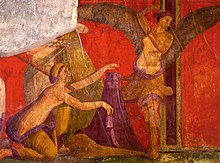Aidos
| Aidos | |
|---|---|
Goddess of shame, modesty, respect, and humility. | |
 | |
| Parents | Eusebia (mother)[citation needed] |
| Equivalents | |
| Roman | Pudicitia[citation needed] |
Aidos or Aedos (/ˈiːdɒs/;[1] Greek: Αἰδώς, pronounced [ai̯dɔ̌ːs]) was the Greek goddess of shame, modesty, respect, and humility.[2] Aidos, as a quality, was that feeling of reverence or shame which restrains men from wrong. It also encompassed the emotion that a rich person might feel in the presence of the impoverished, that their disparity of wealth, whether a matter of luck or merit, was ultimately undeserved. Ancient and Christian humility share common themes: they both reject egotism, self-centeredness, arrogance, and excessive pride; they also recognize human limitations. Aristotle defined it as a middle ground between vanity and cowardice.[citation needed]
Mythology
She was the last goddess to leave the earth after the Golden Age. She was a close companion of the goddess of vengeance Nemesis.[3] One source calls her daughter of Prometheus.[4] Mythologically, she is often considered to be more of a personification than a physical deity.
There are references to her in various early Greek plays, such as Prometheus Bound by Aeschylus, Iphigenia at Aulis by Euripides, and Oedipus Rex by Sophocles.
There were altars to Aidos in Athens[5] and in Sparta.[6]
Some sources mention Aeschyne (Ancient Greek: Αἰσχύνη) as a personification of shame and reverence.[7]
See also
- Eleos: Goddess of pity, mercy, clemency, and compassion.
- Epiphron: God of prudence.
- Sophrosyne: Goddess of moderation and temperance.
Notes
- ^ Zimmerman, J. E. (1964). Dictionary of Classical Mythology. New York: Harper & Row. p. 14.
- ^ Bell, Robert E. (1991). Women of Classical Mythology: A Biographical Dictionary. ABC-CLIO. p. 6. ISBN 9780874365818.
- ^ Hesiod, Works and Days 170 ff.
- ^ Pindar, Olympian Ode 7.44 ff.
- ^ Pausanias, Graeciae Descriptio 1.17.1.
- ^ Pausanias, Graeciae Descriptio 3.20.10–11.
- ^ Aeschylus, Seven Against Thebes 409 ff.; Aesop, Fables 528
References
- Aeschylus, translated in two volumes. 1. Seven Against Thebes by Herbert Weir Smyth, Ph. D. Cambridge, MA. Harvard University Press. 1926. Online version at the Perseus Digital Library. Greek text available from the same website.
- Bell, Robert E., Women of Classical Mythology: A Biographical Dictionary. ABC-Clio. 1991. ISBN 9780874365818, 0874365813.
- Douglas L. Cairns, Aidos: The Psychology and Ethics of Honour and Shame in Ancient Greek Literature, Oxford, Clarendon Press, 1992.
- Hesiod, Works and Days from The Homeric Hymns and Homerica with an English Translation by Hugh G. Evelyn-White, Cambridge, MA.,Harvard University Press; London, William Heinemann Ltd. 1914. Online version at the Perseus Digital Library. Greek text available from the same website.
- Mythology by Edith Hamilton
- Pausanias, Description of Greece with an English Translation by W.H.S. Jones, Litt.D., and H.A. Ormerod, M.A., in 4 Volumes. Cambridge, MA, Harvard University Press; London, William Heinemann Ltd. 1918. ISBN 0-674-99328-4. Online version at the Perseus Digital Library
- Pausanias, Graeciae Descriptio. 3 vols. Leipzig, Teubner. 1903. Greek text available at the Perseus Digital Library.
- Pindar, Odes translated by Diane Arnson Svarlien. 1990. Online version at the Perseus Digital Library.
- Pindar, The Odes of Pindar including the Principal Fragments with an Introduction and an English Translation by Sir John Sandys, Litt.D., FBA. Cambridge, MA., Harvard University Press; London, William Heinemann Ltd. 1937. Greek text available at the Perseus Digital Library.
